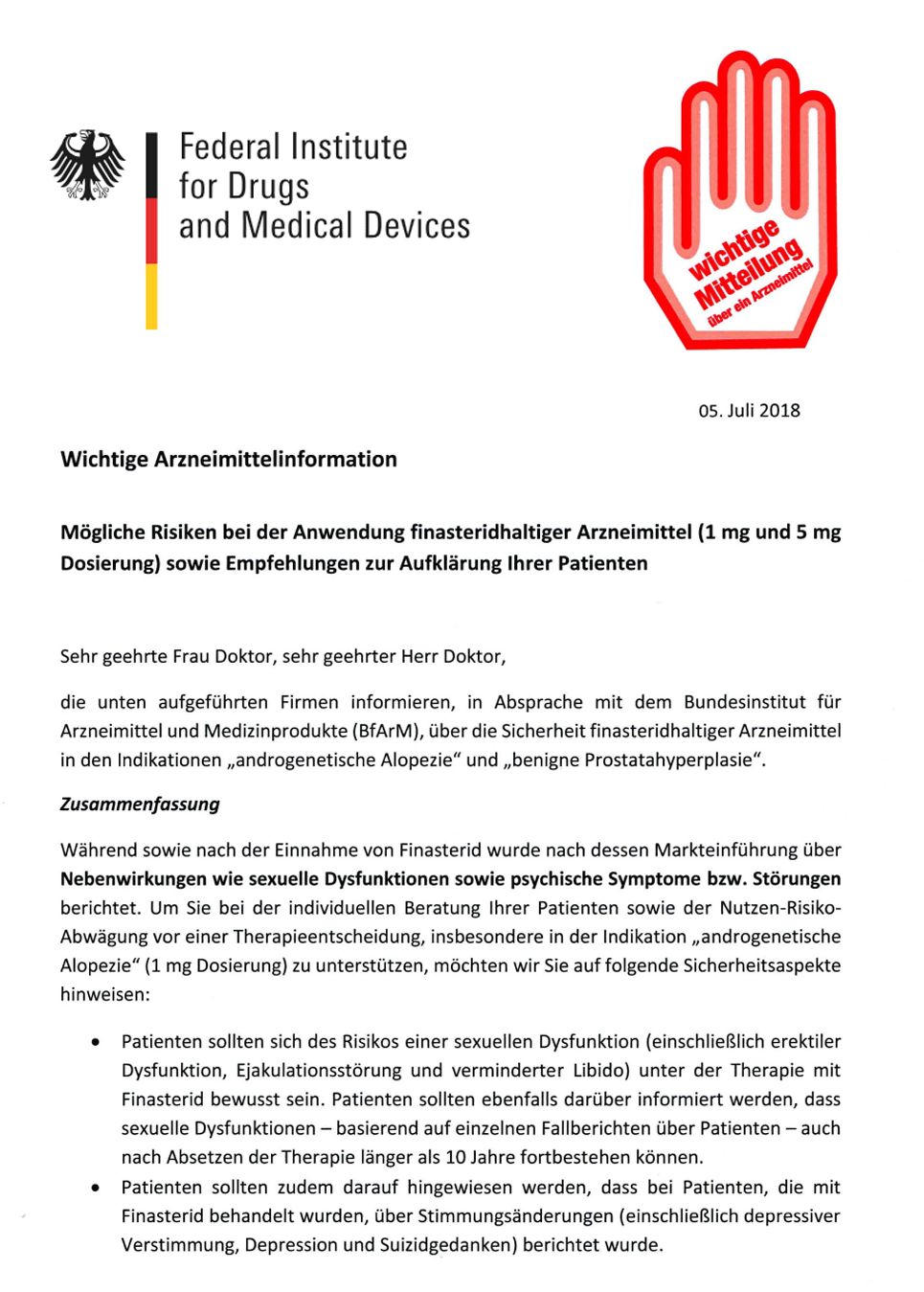July 6, 2018
Dear Friends:
Apparently heeding an appeal by Germany’s largest weekly newspaper, the Federal Institute for Drugs and Medical Devices (BfArM) has dispatched a so-called Red Hand Letter to doctors and pharmacists nationwide, informing them of severe and persistent adverse drug reactions (ADRs) to finasteride.
Five months ago, we told you that Die Zeit ran a 4,500-word report on PFS, headlined I Didn’t Want to Go Bald. A Pill the Doctor Gave Me Destroyed My Life . (English translation here.)
 In it, the paper wrote that BfArM “should be the one to take action and request that doctors in Germany today better educate their patients.”
In it, the paper wrote that BfArM “should be the one to take action and request that doctors in Germany today better educate their patients.”
And so it did. On July 5, the FDA-equivalent agency, in cooperation with 28 German manufacturers and distributors of finasteride, including Merck & Company subsidiary MSD Sharp & Dohme GmbH, informed doctors and pharmacists that:
—“Patients should be aware of the risk of sexual dysfunction when starting finasteride therapy. Patients should also be informed that, based on individual patient case reports, sexual dysfunction may persist for more than 10 years after discontinuation of the therapy.”
—“Patients should also be advised that mood changes (including depressive mood, depression and suicidal thoughts) have been reported in patients treated with finasteride.”
—“On the recommendation of the European Medicines Agency, ‘anxiety’ is included as a new side effect in the specialized finasteride product information.”
The EMA, which is comprised of 31 member nations, issued its first finasteride label-change mandate in 2017, noting that new risks include depression and suicidal ideation. A year later, based on reported cases, it added anxiety to the list.
BfArM’s Red Hand Letter on finasteride risks can be accessed here. (English translation here.)
According to BfArM, Red Hand Letters (aka “Dear Doctor Letters”) “are circulated in order to pass on safety relevant information on a medicinal product to physicians and pharmacists as quickly as possible. Both the envelopes of these letters as well as the information itself bear the symbol of a red hand… These [letters] can contain information regarding previously unknown severe adverse reactions or changes in the indications of the medicinal product.”
We thank BfArM President Karl Broich for taking action in response to ADR reports filed by German PFS patients, including 54-year-old Franz Fuchs, who hails from the town of Konzell.
Franz recently shared his story with the Swiss health-news magazine Puls, for a special report titled Do Anti-Baldness Remedies Make You Impotent?
In addition to Germany, the PFS Foundation has identified seven EMA members nations, as well as three nations outside Europe, that have published warnings of PFS symptoms over the past two years:
—Argentina: National Pharmacovigilance System
—Belgium: Federal Agency for Medicines and Health Products
—Croatia: Agency for Medicinal Products and Medical Devices of Croatia
—Denmark: Danish Medicines Agency
—France: National Agency for the Safety of Medicine and Health Products
—Netherlands: Dutch Medicines Evaluation Board
—New Zealand: New Zealand Medicines and Medical Devices Authority
—Poland: Office for Registration of Medicinal Products
—South Korea: Korean Ministry of Food and Drug Safety (English translation of data here.)
—United Kingdom: Medicines and Healthcare Products Regulatory Agency
We remind all PFS patients who have not yet done so to report their symptoms to the FDA’s MedWatch program as directed here.
Those living outside the US should access the WHO’s Collaborating Centre for International Drug Monitoring list of pharmacovigilance agencies, as well, and report to their respective health agency.
Finally, if you or a loved one are suffering from PFS, and feeling depressed or unstable, please don’t hesitate to contact us as soon as possible via our Patient Support hotline: social@pfsfoundation.org
Thank you.
